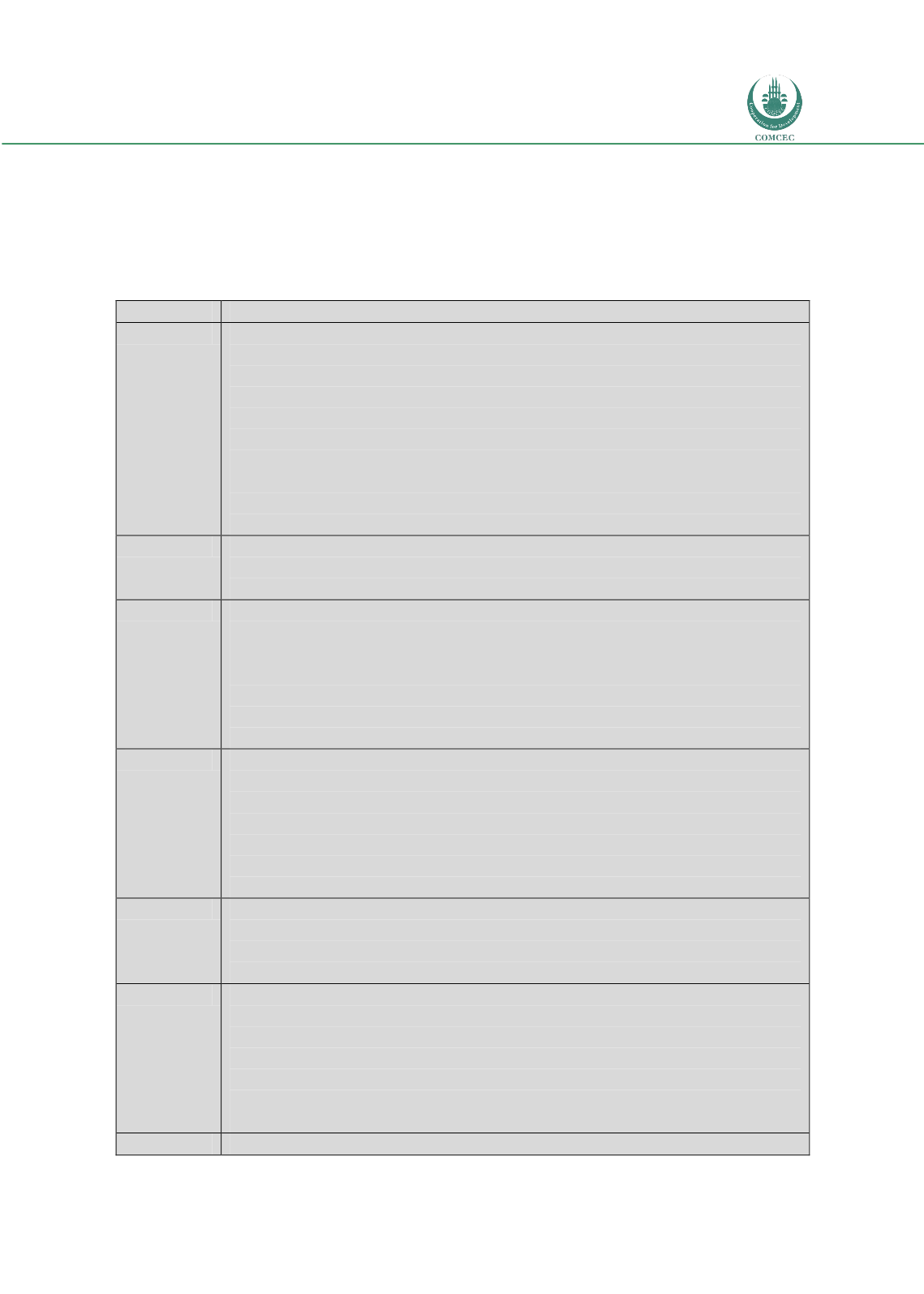

Risk Management in
Islamic Financial Instruments
57
Central Shariah Board to oversee the functions of Islamic finance industry. The council of
guardians in Iran provides guidelines for Islamic finance industry. There is still an on-going
debate about what role the shariah board plan-a supervisory role or certification role of
islamicity of products.
Table 3.3. Regulatory and Supervisory Structures and Laws and Regulations in OIC member countries
Country
Important Regulation, Supervisory Authorities and Risk Management Framework
Bahrain
Regulated by the Bahrain Monetary Agency (BMA)
♦
BMA regulates both commercial banks and
investment banks (securities firms); insurance companies are under separate regulatory authority
♦
Dual banking (Islamic and conventional) banking system; Basel capital requirements and core
principles adopted for both groups,
♦
Four Islamic banking groups: a) Islamic commercial banks, b)
Islamic investment banks, c)Islamic Offshore banks, and d) Islamic banking windows in conventional
banks
♦
Consolidated supervision
♦
International Accounting Standards adopted,
♦
Each Islamic bank
must have a Sharī‘ah board
♦
Compliance with AAOIFI standards under active consideration
♦
Investment deposits, current accounts and capital allocation for assets must be declared,
♦
Mandatory
liquidity management by adopting the standardized maturity buckets of assets
♦
Islamic and
conventional mixed system
The Gambia
Regulated by the Central Bank of Gambia(CBG)
♦
Islamic banking law exists
♦
Dual system
♦
Separate
Sharī‘ah board required
♦
Compliance with Basel capital requirements and core principles and
International Accounting Standards not clear
Indonesia
Regulated by the Central Bank of Indonesia (Bank Central Republic Indonesia – BSRI)
♦
Separate
regulatory bodies for banks and securities firms
♦
Separate Islamic banking law does not exist; Islamic
(Sharī‘ah) banking is covered by added section in the banking law (Act No. 10 1998 and Act No. 23
1999)
♦
Separate Sharī‘ah board required
♦
Islamic windows allowed
♦
Consolidated supervision
♦
Basel
capital requirements and core principles adopted
♦
International Accounting Standards adopted
♦
Major financial transformation in process to strengthen bank capital and solvency
♦
Active Sharī‘ah
bank development strategy in place by the government
Iran
Regulated by the Central Bank of Iran (Bank Jamhuri Islamic Iran)
♦
All banks in the public sector with
a plan for minority privatization
♦
Bank regulation and supervision is strongly affected by monetary as
well as fiscal and other government policies
♦
Single (Islamic) banking system under the 1983 Usury
Free Banking Law
♦
Modes of finance are defined by this Law
♦
Recent policy orientation towards
adopting the Basel capital and supervisory standards and International Accounting Standards
♦
No
Sharī‘ah board for individual banks
♦
Onsite and offsite supervisory methods and objectives defined
and applied
♦
Banks and insurance companies are supervised by different regulatory authorities
Jordan
Regulated by the Central Bank of Jordan (CBJ)
♦
Separate regulatory bodies for banks and securities
firms
♦
Islamic banking law exists
♦
Dual system
♦
Separate Sharī‘ah board required
♦
Consolidated
supervision
♦
Basel capital requirements and core principles adopted
♦
International Accounting
Standards adopted
Kuwait
Supervised by the Central Bank of Kuwait (CBK)
♦
CBK regulates both commercial banks and
investment banks (securities firms); insurance companies are under separate regulatory authority
♦
Dual banking system
♦
Two Islamic banking groups: a) Islamic commercial banks, and b) Islamic
investment banks. Conventional banks not allowed having Islamic banking windows.
♦
Consolidated
supervision
♦
Basel capital requirements and supervisory standards adopted
♦
International
Accounting Standards adopted
♦
Separate Islamic banking law under active consideration
♦
Separate
Sharī‘a hboard for each bank necessary
Malaysia
Regulated by the Central Bank of Malaysia (Bank Nagara Malaysia – BNM)
♦
Insurance companies and

















